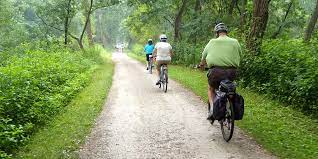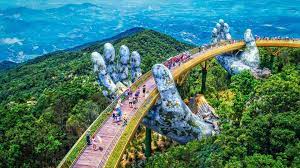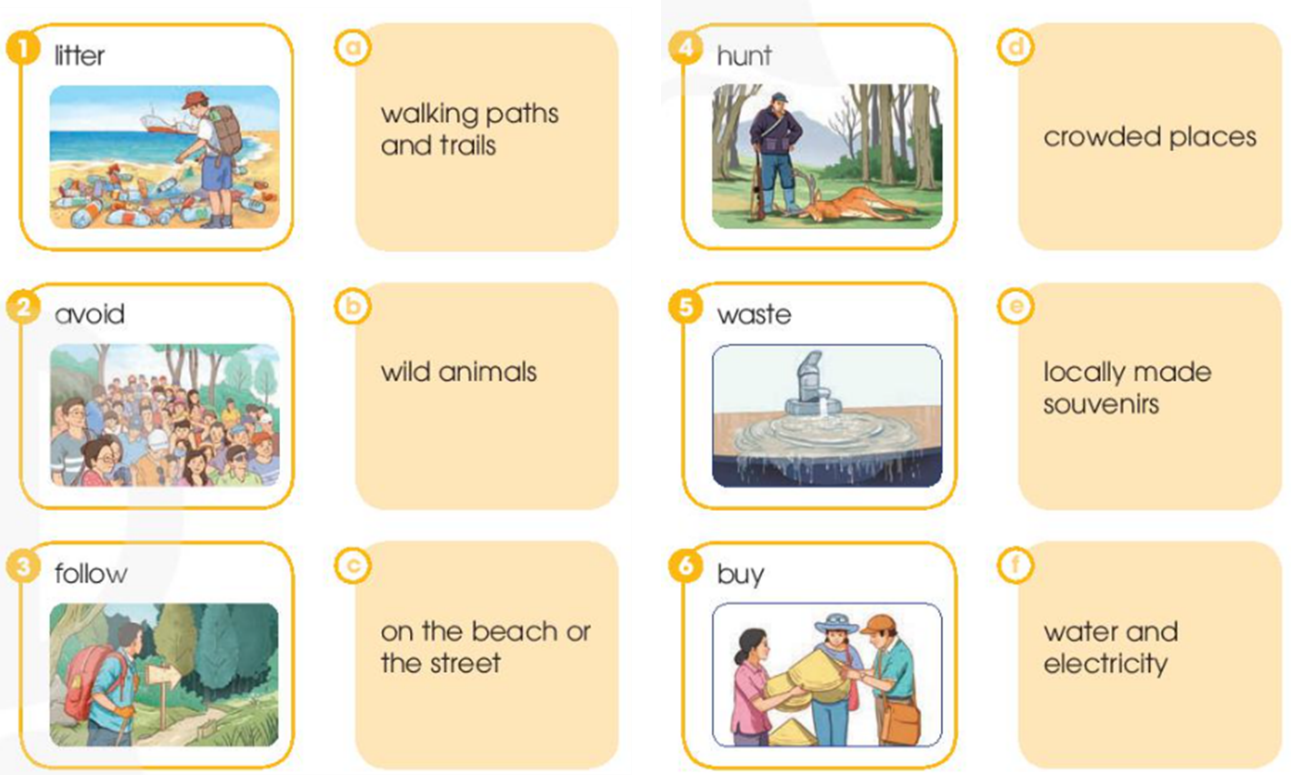Tiếng Anh 10 Unit 10 Speaking1. Match each verb on the left with a phrase on the right. Use the pictures to help you. 2. Work in pairs. Discuss which of the things in 1 we should or should not do to become ecotourists. Use the expressions below to help you. 3. Work in groups. Talk about what tourists should or should not do if they are on an ecotour to a tourist attraction in your local area. Use the discussion questions below to help you. 4. Share your ideas with the whole class. Vote for the best ideas.
Lựa chọn câu để xem lời giải nhanh hơn
Bài 1 Video hướng dẫn giải How to become an ecotourist (Cách để trở thành nhà du lịch sinh thái) 1. Match each verb on the left with a phrase on the right. Use the pictures to help you. (Nối mỗi động từ ở bên trái với một cụm từ ở bên phải. Sử dụng hình ảnh để giúp bạn.)
Phương pháp giải: litter (n): rác thải avoid (v): tránh follow (v): theo, theo dõi hunt (v): săn bắn waste (v): lãng phí buy (v): mua walking paths and trails: đường đi bộ và đường mòn wild animals: động vật hoang dã on the beach or the street: trên bãi biển hoặc đường phố crowded places: những nơi đông đúc locally made souvenirs: quà lưu niệm sản xuất tại địa phương water and electricity: nước và điện Lời giải chi tiết:
1 - c: litter - on the beach or the street (xả rác - trên bãi biển hoặc đường phố) 2 - d: avoid - crowded places (tránh - những nơi đông đúc) 3 - a: follow - walking paths and trails (đi theo - đường đi bộ và đường mòn) 4 - b: hunt - wild animals (săn bắt - động vật hoang dã) 5 - f: waste - water and electricity (lãng phí - nước và điện) 6 - e: buy - locally made souvenirs (mua - quà lưu niệm sản xuất tại địa phương) Bài 2 Video hướng dẫn giải 2. Work in pairs. Discuss which of the things in 1 we should or should not do to become ecotourists. Use the expressions below to help you. (Làm việc theo cặp. Thảo luận về những điều trong bài 1 chúng ta nên làm hoặc không nên làm để trở thành nhà du lịch sinh thái. Sử dụng các cụm dưới đây để giúp bạn.) Useful expressions: ... should (not) / ought (not) to / do sth. Example: We should not litter on the beach or the street. (Ví dụ: Chúng ta không nên xả rác trên bãi biển hoặc đường phố.) One of the things ... can / should (not) do / is (to) do sth. Example: One of the things we should not do is to litter on the beach or the street. (Ví dụ: Một trong những điều chúng ta không nên làm là xả rác trên bãi biển hoặc đường phố.) I suggest that ... (should / should not) do sth. Example: I suggest that we should not litter on the beach or the street. (Ví dụ: Tôi đề nghị rằng chúng ta không nên xả rác trên bãi biển hoặc đường phố.) It will (be better / good ...) / do / avoid doing sth. Example: It will be better for the environment if we avoid littering on the beach or the street. (Ví dụ: Sẽ tốt hơn cho môi trường nếu chúng ta tránh xả rác trên bãi biển hoặc đường phố.) Lời giải chi tiết: We ought not to hunt wild animals. (Chúng ta không nên săn bắt động vật hoang dã.) One of the things we should do is to avoid crowded places. (Một trong những điều chúng ta nên làm là tránh những nơi đông người.) I suggest that we should not waste water and electricity. (Tôi đề nghị rằng chúng ta không nên lãng phí nước và điện.) It will be better following walking paths and trails. (Sẽ tốt hơn khi đi theo những con đường đi bộ và đường mòn.) Bài 3 Video hướng dẫn giải 3. Work in groups. Talk about what tourists should or should not do if they are on an ecotour to a tourist attraction in your local area. Use the discussion questions below to help you. (Làm việc nhóm. Nói về những điều khách du lịch nên làm hoặc không nên làm nếu họ đang tham gia một chuyến du lịch sinh thái đến một điểm thu hút khách du lịch trong khu vực địa phương của bạn. Sử dụng các câu hỏi thảo luận bên dưới để giúp bạn.) - What is the tourist attraction in your local area? (Điểm du lịch ở địa phương bạn là gì) - What do you suggest that tourists should / should not do on an ecotour? (Bạn đề xuất những gì khách du lịch nên / không nên làm trong một chuyến du lịch sinh thái?) - What is the second thing you suggest tourists should / should not do there if they are on an ecotour? Why? (Điều thứ hai mà bạn đề nghị khách du lịch nên / không nên làm ở đó nếu họ đang đi du lịch sinh thái là gì? Tại sao?) - Do you believe that it will be better for the environment if tourists follow these suggestions? How will your local area and people benefit? What can you do to help? (Bạn có tin rằng sẽ tốt hơn cho môi trường nếu khách du lịch làm theo những gợi ý này? Khu vực địa phương của bạn và người dân sẽ được hưởng lợi như thế nào? Bạn có thể làm gì để giúp đỡ?) Lời giải chi tiết: - The tourist attraction in my local area is Eco-Park. (Điểm thu hút khách du lịch ở địa phương tôi là Công viên sinh thái.) - I suggest that tourists should prepare food with less packaging and shouldn’t litter to the park. (Tôi đề nghị khách du lịch nên chuẩn bị thức ăn ít bao bì hơn và không nên xả rác ra công viên.) - The second thing I suggest tourists should do is travelling by electric cars or bicycles as it will help protect the green environment. (Điều thứ hai tôi đề nghị du khách nên làm là di chuyển bằng ô tô điện hoặc xe đạp vì nó sẽ giúp bảo vệ môi trường xanh.) - I believe that it will be better for the environment if tourists follow these suggestions. Our local area will reduce carbon footprint, and I can help introduce green ways to relax in the park. (Tôi tin rằng sẽ tốt hơn cho môi trường nếu khách du lịch làm theo những gợi ý này. Khu vực địa phương của chúng tôi sẽ giảm lượng khí thải carbon và tôi có thể giúp giới thiệu những cách “xanh” để thư giãn trong công viên.) Bài 4 Video hướng dẫn giải 4. Share your ideas with the whole class. Vote for the best ideas. (Chia sẻ ý kiến của bạn với cả lớp. Bình chọn cho những ý tưởng hay nhất.) Lời giải chi tiết: If tourists are on an ecotour to Eco-Park, a tourist attraction in my local area, I will suggest them doing several things. Firstly, tourists should prepare food with less packaging and shouldn’t litter to the park. This will protect the environment. The second thing I suggest tourists should do is travelling by electric cars or bicycles as it will help protect the green environment. I believe that it will be better for the environment if tourists follow these suggestions. Our local area will reduce carbon footprint, and I can help introduce green ways to relax in the park. Tạm dịch: Nếu du khách đang đi du lịch sinh thái đến Công viên sinh thái, một điểm thu hút khách du lịch trong khu vực địa phương của tôi, tôi sẽ đề nghị họ làm một số điều. Đầu tiên, du khách nên chuẩn bị thức ăn ít bao bì và không nên xả rác vào công viên. Điều này sẽ bảo vệ môi trường. Điều thứ hai tôi đề nghị du khách nên làm là di chuyển bằng ô tô điện hoặc xe đạp vì nó sẽ giúp bảo vệ môi trường xanh. Tôi tin rằng sẽ tốt hơn cho môi trường nếu khách du lịch làm theo những gợi ý này. Khu vực địa phương của chúng tôi sẽ giảm lượng khí thải carbon và tôi có thể giúp giới thiệu những cách “xanh” để thư giãn trong công viên. Từ vựng 1. (n): đường mòn The trail was not clearly marked. (Đường mòn không được đánh dấu rõ ràng.)  2. (v): đề nghị I suggest that we should not litter on the beach or the street. (Tôi đề nghị rằng chúng ta không nên xả rác trên bãi biển hoặc đường phố.) 3. (v.phr): tốt hơn It will be better for the environment if we avoid littering on the beach or the street. (Sẽ tốt hơn cho môi trường nếu chúng ta tránh xả rác trên bãi biển hoặc đường phố.) 4. tourist attraction /ˈtʊərɪst əˈtrækʃ(ə)n/ (n.phr): điểm thu hút khách du lịch What is the tourist attraction in your local area? (Điểm thu hút khách du lịch trong khu vực địa phương của bạn là gì?)  5.
>> Học trực tuyến Lớp 10 cùng thầy cô giáo giỏi tại Tuyensinh247.com, (Xem ngay) Cam kết giúp học sinh học tốt, bứt phá điểm 9,10 chỉ sau 3 tháng, làm quen kiến thức, định hướng luyện thi TN THPT, ĐGNL, ĐGTD ngay từ lớp 10
|
























